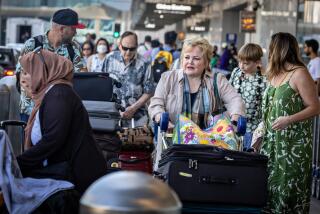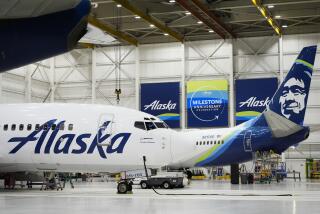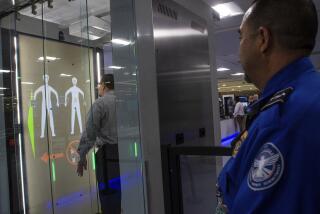Attacks Prompt Calls for More Passenger Profiling
- Share via
WASHINGTON — The apparent ease with which Middle Eastern terrorists hijacked four U.S. commercial jets is raising calls for expanded screening of passengers by nationality or appearance--a controversial practice that critics say unfairly targets minorities.
“If we are in fact engaging in a war against terrorism, there is going to have to be a relaxation on the ability to look for certain kinds of conduct and perhaps even appearance,” said William H. Webster, a former FBI director who is serving on a commission investigating security holes at the agency.
“We can’t blanket a whole ethnic group,” he said. “But this area is going to have to be rethought. If people are coming from a country that we think harbors terrorists, then they are going to have to be subjected to substantial scrutiny.”
Civil libertarians vow to challenge any efforts to increase reliance on the practice, known as profiling.
“If profiling systems are widely institutionalized, they could be used to discriminate against anyone with a certain name or background,” warned David Sobel, staff attorney for the Electronic Privacy Information Center, an advocacy group in Washington.
Atty. Gen. John Ashcroft said earlier this year that stopping racial profiling, particularly by local police departments, was one of his top priorities.
But Webster and others say the nation needs to balance civil liberties with the new realities of terrorism. They predicted courts would uphold expanded use of profiling at airports, if it is shown to be effective and objective.
“Used correctly, it can be a very valuable law enforcement tool,” said Peter Tarlow, who has advised the U.S. government about how to protect landmarks such as the Hoover Dam and is training FBI agents in preparation for the 2002 Olympics in Salt Lake City. “It can also be a terrible prejudice tool. It’s a fine line.”
He noted that profiling is far more common, and less controversial, in Israel and European countries with a history of terrorist attacks.
Representatives for major airlines declined to comment on their security procedures. Officials at the Federal Aviation Administration could not be reached for comment.
Until recently, passenger profiling varied among airlines, which conducted screening based upon their own confidential criteria. One airline might target passengers who paid in cash, while another would look for those holding passports from certain countries.
The profiling was conducted by low-level airline employees at ticket counters, who would flag certain passengers for extra scrutiny or surveillance.
But the old method angered some passengers who believed they were targeted solely on the basis of race.
“I was targeted for being black,” said U. Lawrence Boze, a Houston attorney and former president of the National Bar Assn. He sued US Airways for detaining him at Baltimore Washington International Airport in 1997 and searching his bags without a valid reason. The suit ended in a confidential settlement.
“I’ve been thinking a lot about that day because of these tragic events,” Boze said. “It would be so sad if people used this to increase profiling of any group.”
Partly in response to cases such as Boze’s, the FAA revamped its screening guidelines in 1997. A security commission created after the 1996 explosion of TWA Flight 800 over New York recommended that airlines switch to a new profiling system, called Computer-Assisted Passenger Screening, or CAPS.
Rather than rely on the judgment of airline employees, CAPS uses a computer program to gather and analyze information about passengers and signals employees to subject certain passengers to greater scrutiny.
“It was a politically correct way to deal with a system that wasn’t politically correct,” said Charles Slepian, a New York attorney specializing in travel safety.
As an additional deterrent, CAPS also randomly selects a limited number of passengers.
“The CAPS system virtually eliminates the possibility of subjective selection and inadvertent or deliberate discrimination by airline employees,” the FAA said in 1999.
But civil liberties groups remain skeptical, particularly because the criteria used in the computer screening have been kept classified.
“We don’t really know how effective it is, because we don’t know exactly how it works,” Sobel said.
*
Chief Washington correspondent Jack Nelson contributed to this story.
More to Read
Sign up for Essential California
The most important California stories and recommendations in your inbox every morning.
You may occasionally receive promotional content from the Los Angeles Times.













